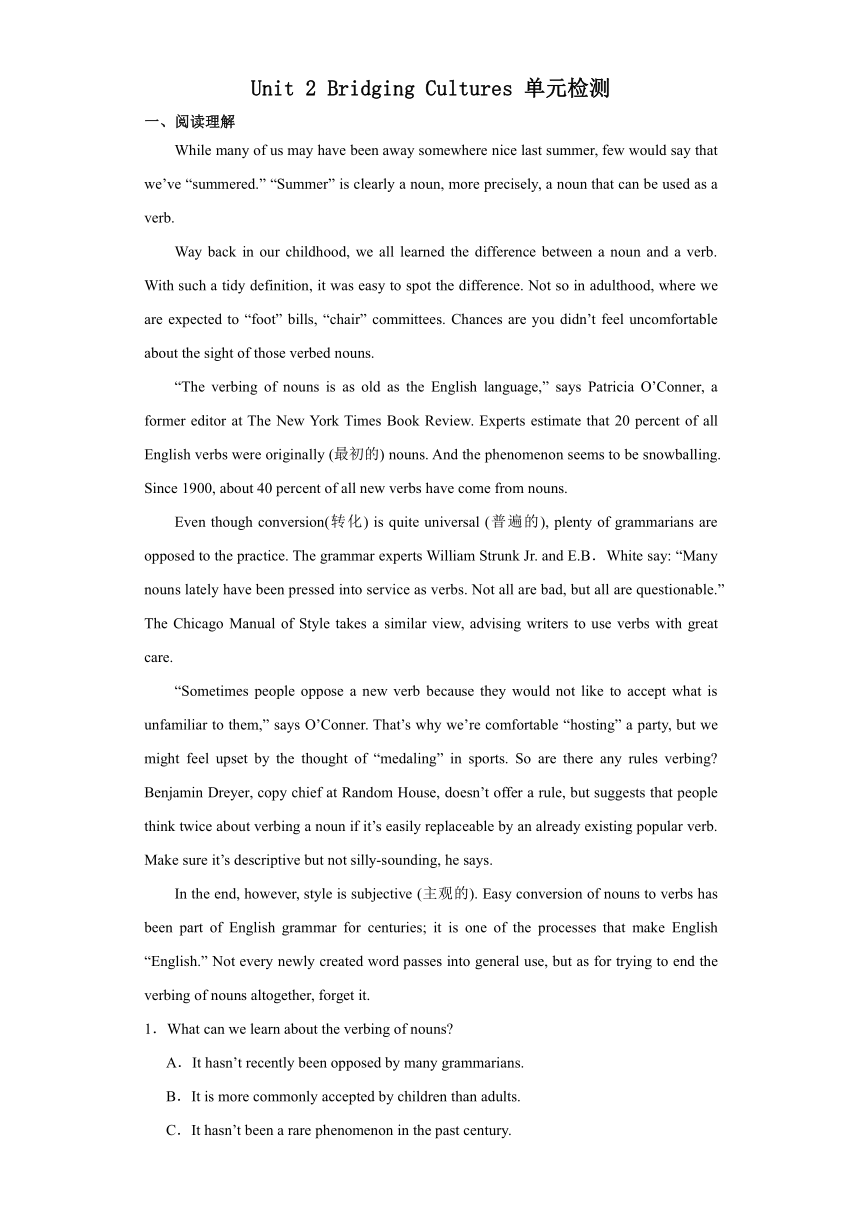
Unit 2 Bridging Cultures 单元检测 一、阅读理解 While many of us may have been away somewhere nice last summer, few would say that we’ve “summered.” “Summer” is clearly a noun, more precisely, a noun that can be used as a verb. Way back in our childhood, we all learned the difference between a noun and a verb. With such a tidy definition, it was easy to spot the difference. Not so in adulthood, where we are expected to “foot” bills, “chair” committees. Chances are you didn’t feel uncomfortable about the sight of those verbed nouns. “The verbing of nouns is as old as the English language,” says Patricia O’Conner, a former editor at The New York Times Book Review. Experts estimate that 20 percent of all English verbs were originally (最初的) nouns. And the phenomenon seems to be snowballing. Since 1900, about 40 percent of all new verbs have come from nouns. Even though conversion(转化) is quite universal (普遍的), plenty of grammarians are opposed to the practice. The grammar experts William Strunk Jr. and E.B.White say: “Many nouns lately have been pressed into service as verbs. Not all are bad, but all are questionable.” The Chicago Manual of Style takes a similar view, advising writers to use verbs with great care. “Sometimes people oppose a new verb because they would not like to accept what is unfamiliar to them,” says O’Conner. That’s why we’re comfortable “hosting” a party, but we might feel upset by the thought of “medaling” in sports. So are there any rules verbing Benjamin Dreyer, copy chief at Random House, doesn’t offer a rule, but suggests that people think twice about verbing a noun if it’s easily replaceable by an already existing popular verb. Make sure it’s descriptive but not silly-sounding, he says. In the end, however, style is subjective (主观的). Easy conversion of nouns to verbs has been part of English grammar for centuries; it is one of the processes that make English “English.” Not every newly created word passes into general use, but as for trying to end the verbing of nouns altogether, forget it. 1.What can we learn about the verbing of nouns A.It hasn’t recently been opposed by many grammarians. B.It is more commonly accepted by children than adults. C.It hasn’t been a rare phenomenon in the past century. D.It is easily replaced by existing verbs in practice. 2.What is most leading experts’ attitude towards the practice of the verbing of nouns A.Cautious (谨慎的). B.Satisfied. C.Disappointed. D.Unconcerned. 3.What does the author think of ending the verbing of nouns A.Predictable. B.Practicable. C.Approaching. D.Impossible. One day, just as the teacher was coming into the classroom, one of the boys, Bill, said loudly, “The teacher is a real fool.” To their surprise,the teacher pretended not to have heard this. He paid no attention to anyone and said nothing. He just went up to the teacher’s desk and began the class. He said. “Today we are going to study punctuation ( ... ...
~~ 您好,已阅读到文档的结尾了 ~~

